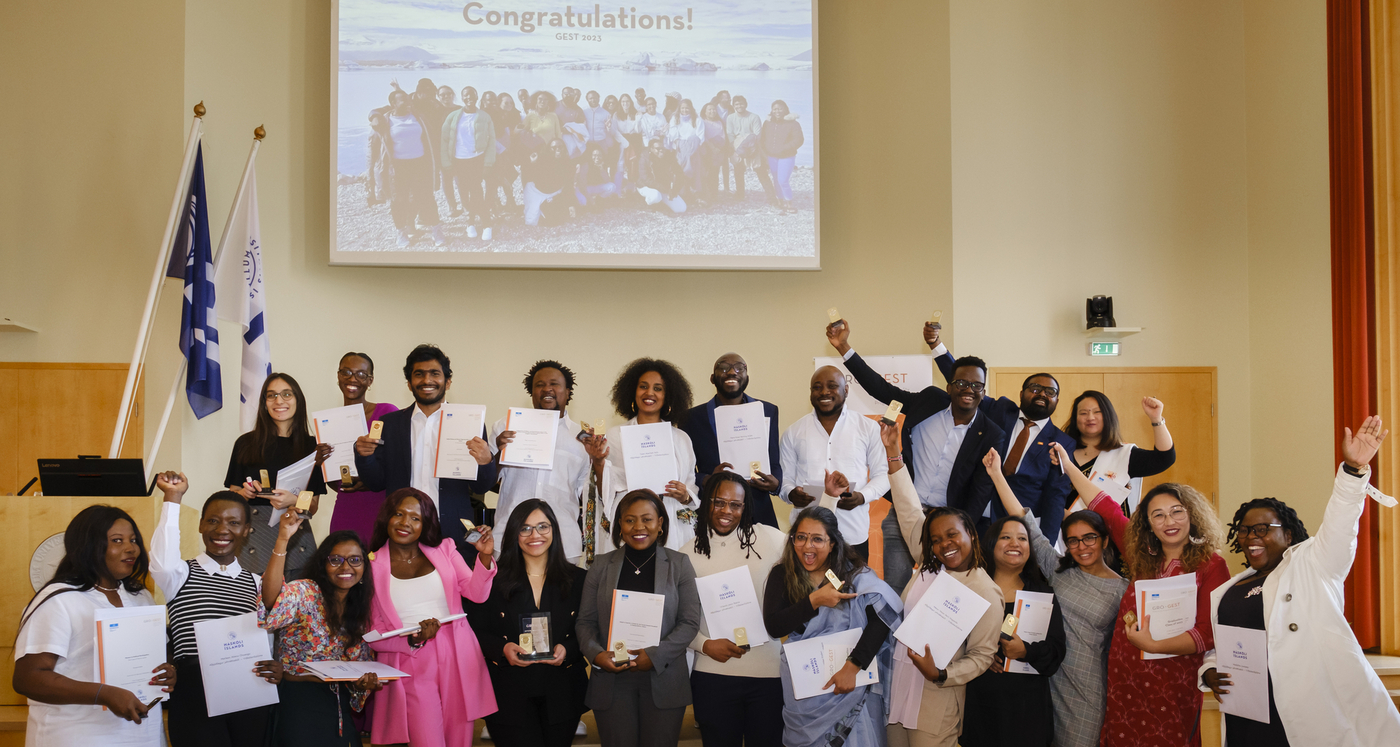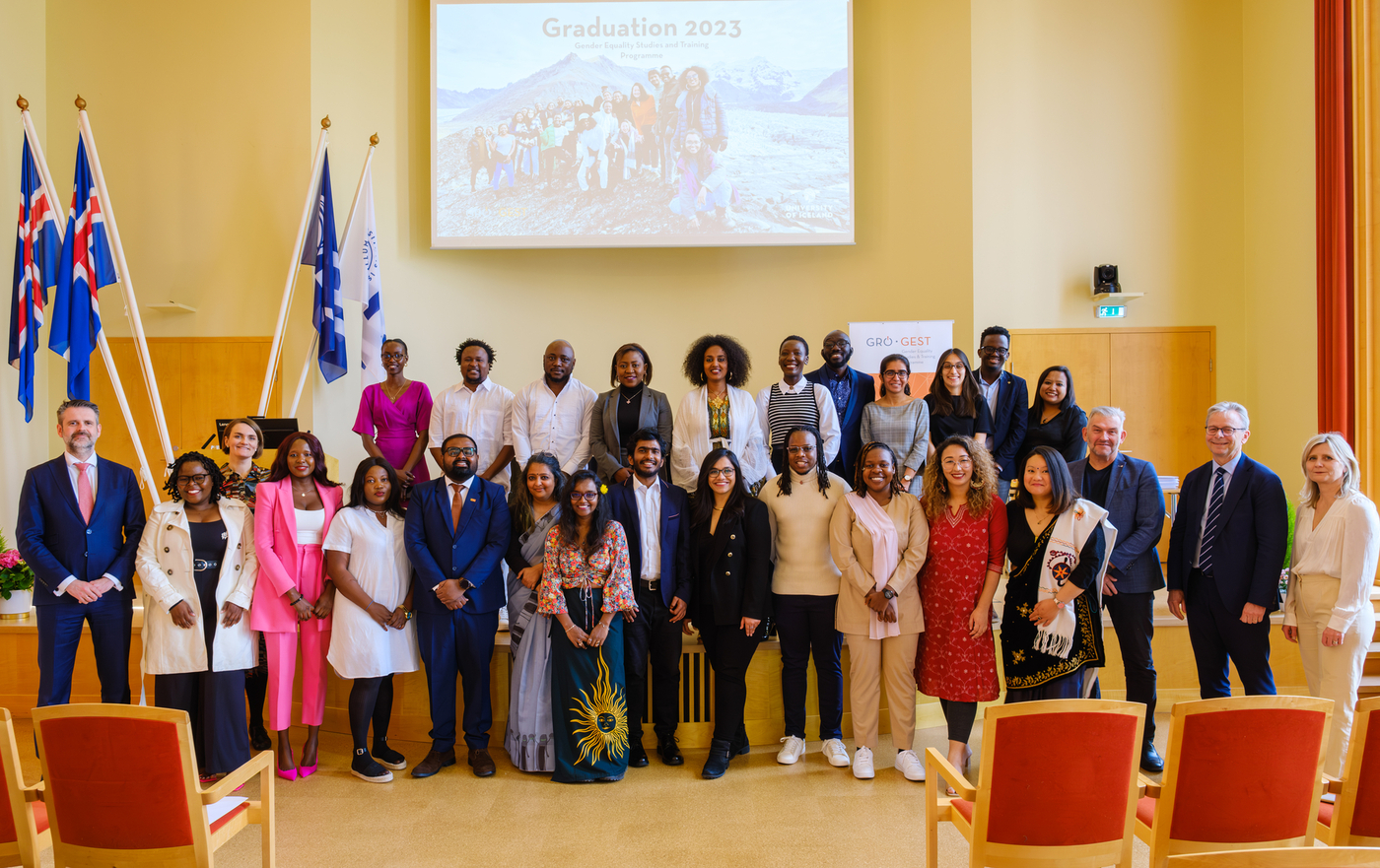GRÓ GEST celebrates the graduation of its 15th cohort of young gender equality professionals. This year the graduates represent 16 countries; Cameroon, Ethiopia, Ghana, India, Jamaica, Kenya, Kosovo, Malawi, Mozambique, Nepal, Pakistan, Sierra Leone, Sri Lanka, Tanzania, Uganda, and Zimbabwe. The cohort is made up of passionate gender equality practitioners from a multitude of diverse backgrounds within government, activism, media, art, academia and more.
The 2023 cohort arrived in Iceland in the wintery dark of January and have worked diligently through five months of academic and cultural challenges, now finally arriving at graduation in the bright Icelandic summer. Throughout the semester, the fellows have completed six interdisciplinary modules: Gender Theories and Concepts; Project Development Tools; Gender, Violence and Security; Gender, Labour and Migration; Gender, Environment and Climate Change; and the Final Assignment. Many international and Icelandic scholars have contributed to the programme. The students also receive funding fromt the EU International Credit Mobility.
It is the 15th graduation of GEST, and the fourth graduation of GEST as a part of GRÓ Centre for Capacity Development, Sustainability and Societal Change. With this year’s cohort of 23 graduating fellows, the total number of GEST alumni is counting 218, in an ever-expanding alumni network.
Graduation ceremony
The graduation ceremony took place at the University of Iceland on Wednesday 24 May and was attended by GEST fellows, supervisors, staff, and distinguished guests. Dr. Irma Erlingsdóttir, Director of GRÓ GEST formally opened the ceremony and delivered the welcome address, followed by Dr. Jón Atli Benediktsson, Rector of the University of Iceland, and Martin Eyjólfsson, Permanent Secretary of State of Iceland. Dr. Irma Erlingsdóttir and Nína Björk Jónsdóttir, Director General of GRÓ Centre distributed the diplomas from the University of Iceland and the GRÓ Centre.
The fellows’ address was delivered by Wevyn Helen Awiti Muganda from Kenya, in which she recounted some of the personal struggles and joys, as well as academic highlights of the semester. She also emphasized that the GEST programme enhances people’s understanding of gender and brings about hope. She said: “We know now that sustainable peace and development are not possible if we leave others behind. We understand that our positionalities and intersectional identities shape our experiences in the world. I commit to learning and re-learning everything I know about gender and gender equality … Thank you for being there for us. Thank you for allowing us to experience a different world and to be inspired by it.”
Musicians Silja Rós and Kjalar contributed to the ceremony by performing their beautiful song Together We Grow, and the celebratory Don’t Stop Me Now.
It is the 15th graduation of GEST, and the fourth graduation of GEST as a part of GRÓ Centre for Capacity Development, Sustainability and Societal Change. With this year’s cohort of 23 graduating fellows, the total number of GEST alumni is counting 218, in an ever-expanding alumni network.

The Vigdís Finnbogadóttir Award
The Vigdís Finnbogadóttir award was presented for the best final assignments in two distinct categories by GEST academic coordinator Dr. Thomas Brorsen Smidt and GEST research specialist Dr. Giti Chandra. The first category is for applied projects or project documents, in which the fellow addresses and provides practical recommendations for an issue in relation to gender equality in their home country. The second category is for research or research proposals, which aim at contributing to the existing academic literature on a particular topic relating to gender equality or outlining a proposal for a future PhD project.
For all final assignments, to be considered for the Vigdís Finnbogadóttir award, it applies that the work must address gender issues that are of concern in the author’s home country. It must show evidence of sophisticated gender analysis with appropriate academic references, and it shall be well-structured and written. The fellows produced several final assignments that all demonstrated critical thinking, creativity, and excellence.
In the category of applied projects and project proposals, Sana Salim Lokhandwala from Pakistan was awarded for her assignment “Period Fellowship: Towards Menstrual Justice in Pakistan”. The project argues for a new and holistic approach that maps out an immersive leadership journey designed to nurture future leaders in the menstrual health and human rights ecosystem to reduce gender inequality and achieve menstrual justice in Pakistan.
In the category of research and research proposals, Bijal Dipak Lal from Tanzania was awarded for her assignment “Sexual Autonomy Matters: Marginalization of Central Experiences for Women with Intellectual and Developmental Disabilities in Tanzania”. The research interweaves various scholarly fields to approach a unique research question concerned with the cultural barriers to sexual autonomy for disabled women in Tanzania, while at the same time navigating tricky ethical dilemmas regarding a population that experiences heightened vulnerabilities to violence, but still fights for basic forms of social access to romance, sexuality, and partnership.
The GRÓ GEST team congratulates the fellows and thanks its partners
The GEST team congratulates the 2023 fellows and wishes them safe travels home. The GEST team is thankful to the fellows for their persistence and positivity towards travelling long distances to Iceland, and for participating actively in the programme, sharing their knowledge and expertise among their fellows and teachers. The GEST team would also like to thank its main partners, the University of Iceland and the GRÓ Centre for a fruitful collaboration. Furthermore, the GEST team thanks the Student Services and the International Office of the University of Iceland for their support and facilitation.
Photos from the graduation ceremony taken by Kristinn Ingvarsson can be found here.





